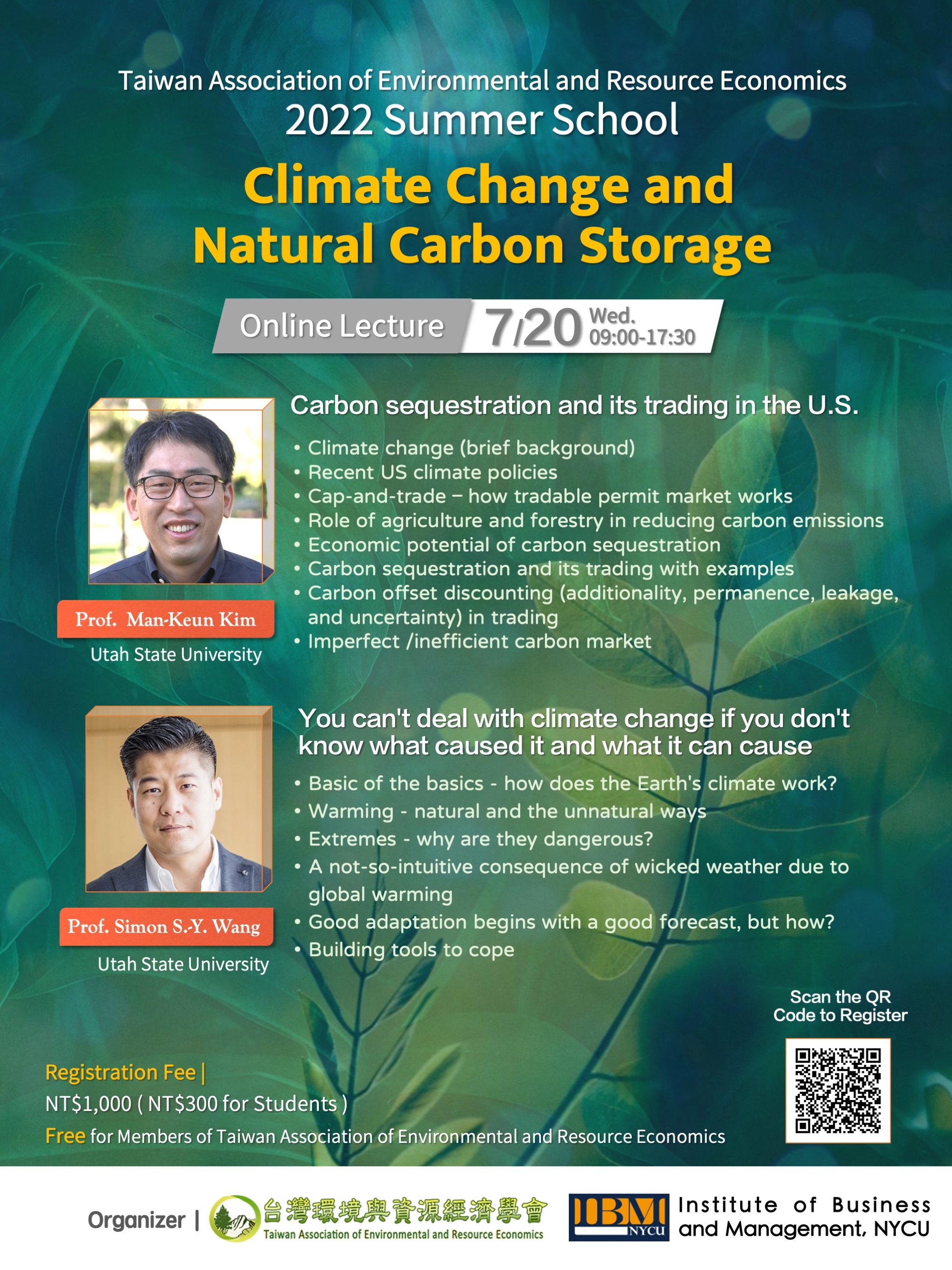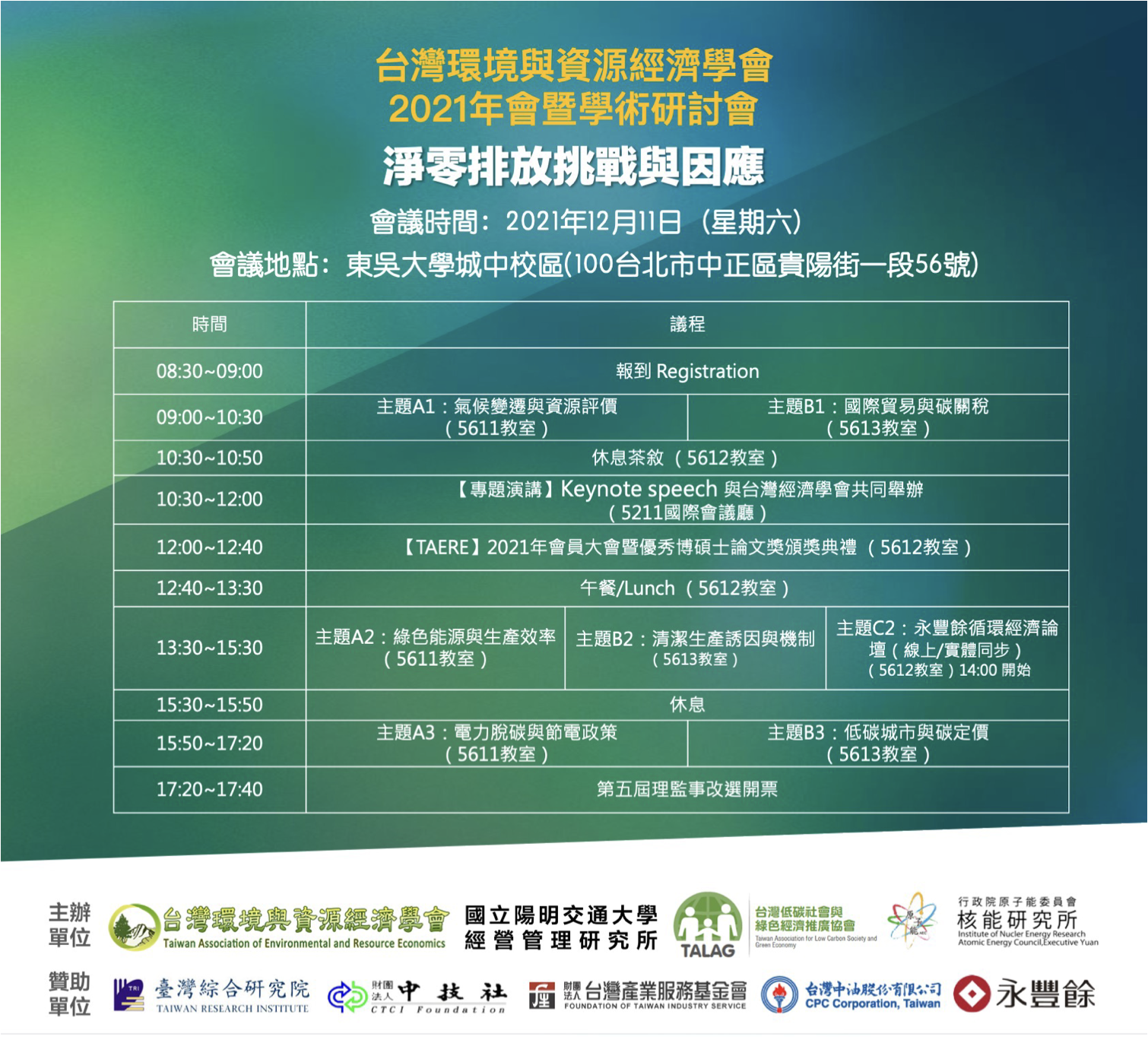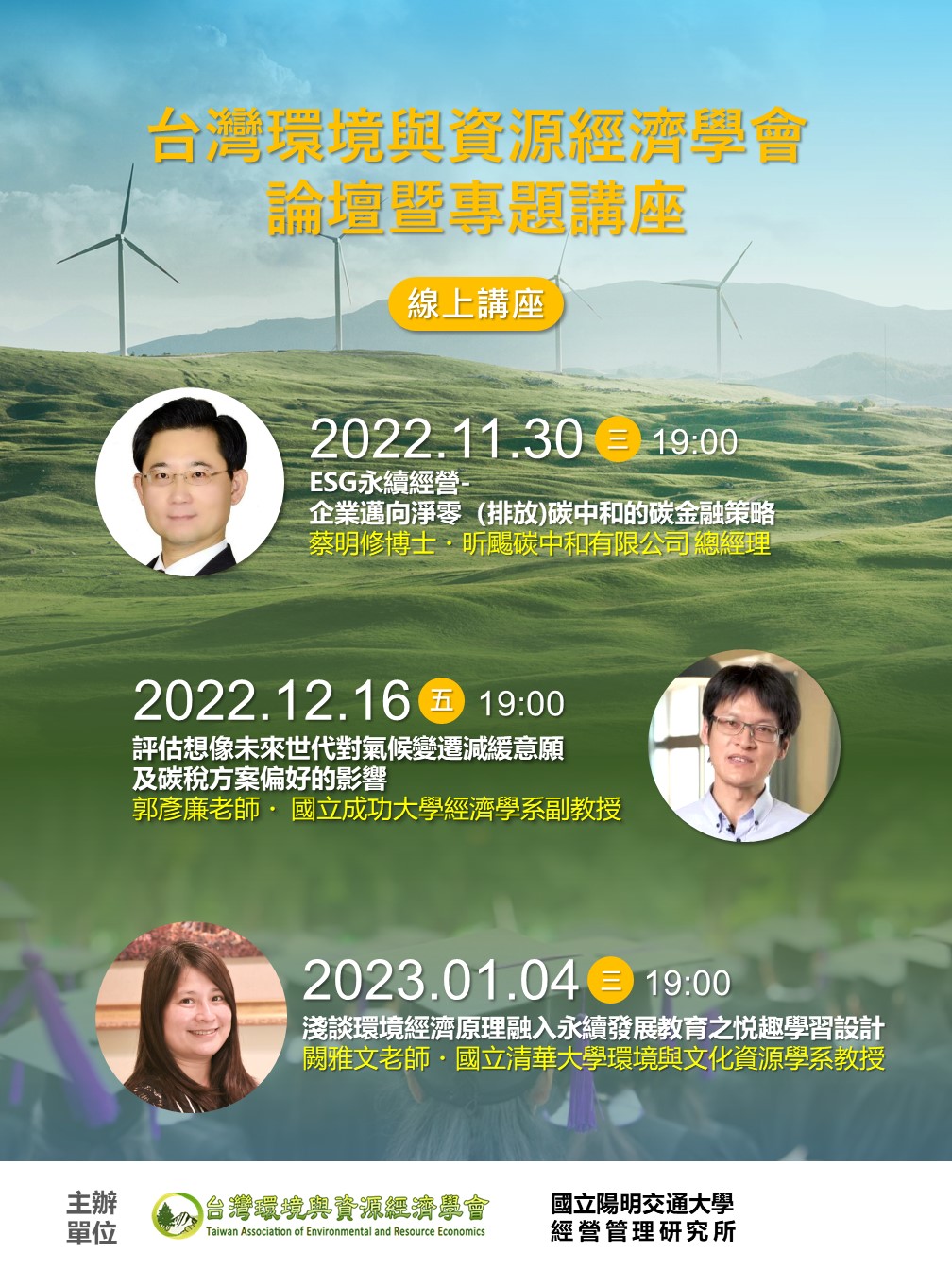- 詳細內容
- 分類:活動訊息
台灣環境與資源經濟學會2022年下半年及2023年初規劃線上專題演講共三場,歡迎踴躍報名參加!
2022.11.30(三)19:00 蔡明修教授: ESG永續經營-企業邁向淨零(排放)碳中和的碳金融策略
2022.12/16(五)19:00 郭彥廉教授: 評估想像未來世代對氣候變遷減緩意願及碳稅方案偏好的影響
2023.01/04(三)19:00 闕雅文教授:淺談環境經濟原理融入永續發展教育之悦趣學習設計
(線上會議室連結將於活動前一天Email通知)
- 詳細內容
- 分類:年會與研討會資訊
2022台灣環境與資源經濟學會年會暨學術研討會
《淨零挑戰與解方》
徵稿啟事
- 為促進學術交流,台灣環境與資源經濟學會將於2022年12月3日(星期六),假國立政治大學(台北市文山區指南路二段64號)舉行學術論文發表會暨2022年會員大會。
- 凡與環境與資源經濟學相關之理論、實證、政策議題皆歡迎,會議將同時包含中文及英文發表場次。
- 會議原則以實體會議為主,本會將視新冠疫情,適時規劃視訊會議模式。如因疫情發布二級以上(含)警戒,會議將改為線上會議,細節將公布在本會網頁。
- 為提升本次會議報告文章的品質以及論文發表人能得到建設性的意見,本次會議將廣邀資深及優秀學者與會報告論文並邀請他們擔任評論人。
- 年會發表之論文,經作者同意後,由本學會編輯委員會經匿名審查,決定是否刊登本學會《綠色經濟》特刊,或推薦至《台灣能源期刊》,由該期刊另行邀稿。
投稿指南
- 請至【線上投稿專頁】投稿
- 投稿摘要請勿超過兩頁,投稿全文須包含文章標題,作者姓名,研究主題,研究方法,主要發現以及參考文獻。
- 合著文章,其中至少一位作者應為台灣環境與資源經濟學會會員,請註明會議論文發表人,每位發表人以發表一篇論文為限,國外專家學者除外。
重要時程
- 摘要投稿至2022年10月21日止。
- 審查結果將於2022年10月28日通知。
- 全文投稿至2022年11月7日止。
聯繫
- 年會委員會Email:Email住址會使用灌水程式保護機制。你需要啟動Javascript才能觀看它,聯絡電話:(02)88741111-67335洪小姐。
- TAERE Email: Email住址會使用灌水程式保護機制。你需要啟動Javascript才能觀看它,聯絡電話0986-163-139常小姐。
- 詳細內容
- 分類:暑期課程資訊
TAERE 2022 Summer School
Climate Change and Natural Carbon Storage
台灣環境與資源經濟學會2022暑期課程
氣候變遷與自然碳匯

- 詳細內容
- 分類:活動訊息

- 詳細內容
- 分類:年會與研討會資訊
2021台灣環境與資源經濟學會年會暨學術研討會
淨零排放挑戰與因應
2021台灣環境與資源經濟學會年會暨淨零排放挑戰與因應學術研討會,是本學會舉行的第七屆環境與資源經濟學術研討會,將於2021年12月11日,假東吳大學城區部(台北市貴陽街一段56號)舉行,匯集來自國內外著名學者與學術機構投稿,研究課題包括氣候變遷、能源、水資源、生態等領域及淨零目標管理與碳境稅評估等環境資源理論與實證研究。期待將研究成果,提供政府施政及產業發展策略規劃之參考。
時 間:2021年12月11日(星期六)
地 點:東吳大學城區部(台北市貴陽街一段56號)
- 捷運綠線(松山新店線)至小南門(1號出口),步行即至
- 捷運藍線(板南線)至西門站(2號出口)下車,步行即至
- 公車至台北車站下車,轉搭捷運至小南門(1號出口)或西門站(2號出口),步行即至
- 公車1503、235、270、38、662、663(東吳大學城中校區站);12、20、202、205、212、218、223、234、246、250、253、260、265、302、307、310、604、651、9、956、仁愛幹線、藍29、重慶幹線(小南門);252、262、262區、304、38、604、660(捷運小南門站)

- 詳細內容
- 分類:活動訊息
2021台灣環境與資源經濟學會年會暨學術研討會
淨零排放挑戰與因應
2021台灣環境與資源經濟學會年會暨淨零排放挑戰與因應學術研討會,是本學會舉行的第七屆環境與資源經濟學術研討會,將於2021年12月11日,假東吳大學城區部(台北市貴陽街一段56號)舉行,匯集來自國內外著名學者與學術機構投稿,研究課題包括氣候變遷、能源、水資源、生態等領域及淨零目標管理與碳境稅評估等環境資源理論與實證研究。期待將研究成果,提供政府施政及產業發展策略規劃之參考。
時 間:2021年12月11日(星期六)
地 點:東吳大學城區部(台北市貴陽街一段56號)
報名網址:https://www.beclass.com/rid=25465b961a4ea469f0e5
- 捷運綠線(松山新店線)至小南門(1號出口),步行即至
- 捷運藍線(板南線)至西門站(2號出口)下車,步行即至
- 公車至台北車站下車,轉搭捷運至小南門(1號出口)或西門站(2號出口),步行即至
- 公車1503、235、270、38、662、663(東吳大學城中校區站);12、20、202、205、212、218、223、234、246、250、253、260、265、302、307、310、604、651、9、956、仁愛幹線、藍29、重慶幹線(小南門);252、262、262區、304、38、604、660(捷運小南門站)


